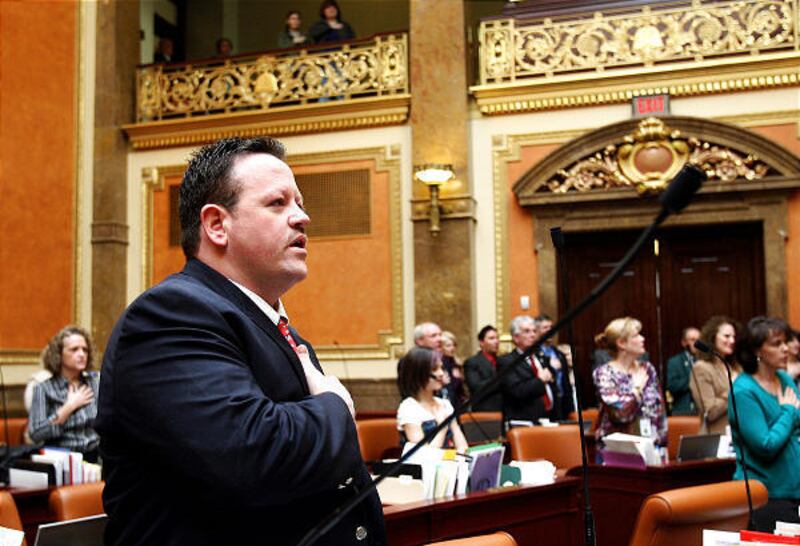SALT LAKE CITY — While the two dozen or so states' rights bills making their way through the Utah Legislature put the state in league with a national trend, what's to be gained by the efforts, and at what cost, remains a topic of debate.
Rep. Carl Wimmer, R-Herriman, has become the defacto point man on asserting 10th Amendment rights for the state and is one of the founding members of the Patrick Henry Caucus, a group of legislators dedicated to "reclaim the constitutionally protected rights of the states." Wimmer has sponsored or co-sponsored four of the bills and advocated on behalf of most of the rest; work he said is necessary to restore a balance of power between the state and federal government.
"The federal government has overstepped its bounds in Utah and the rest of the country and it's time to move the other direction," he said. "These bills, the state sovereignty package, are aimed at doing just that."
Those proposals range from simple declarations of Utah's right to sovereignty to asserting eminent domain over federal land holdings in the state. One bill would give the Legislature the power to authorize or reject any federally mandated health care reform, a theme already taken up by some 36 states, according to the National Conference of State Legislatures. And the 10th Amendment Center is tracking bills addressing its namesake in 19 states.
Wimmer said the success of the Utah proposals — most of them are finding the votes thanks mostly to the GOP majority — is due to careful planning and "collaborative work between the House and the Senate."
House Minority Leader David Litvack, D-Salt Lake, said that collaboration, however, has not extended across the aisle.
"The minority party has not been consulted and has not had a seat at the table on these issues," he said. "If we had, I believe this could have evolved into a much more partisan effort."
Instead, Litvack said the work on federalism issues has "morphed into strident debate rather than dialogue," and made the process much less productive and effective than it could have been. He's also noted throughout the session that the bills lack constructive ideas.
"The people of Utah have asked us to come up with real solutions to real problems," Litvack said. "What they do not want is political grandstanding that does nothing to help put people back to work or help families through these difficult times."
The price tag associated with the proposals has also raised some red flags among critics. An analysis by House Democrats' staff determined the average cost of running a bill at about $2,500 or a total of $60,000 for the 24 that are directly focused on federalism issues. Litigation could easily expand that figure into the millions, a concern voiced by Gov. Gary Herbert in signing a controversial challenge to federal interstate commerce law. Herbert only approved the bill after consultation with Attorney General Mark Shurtleff and others who assured him the state could likely stay out of a fight already under way between the federal government and private litigants over the Montana law on which the Utah proposal was modeled.
University of Utah political science professor Matthew Burbank said that bill, SB11, sponsored by Sen. Margaret Dayton, R-Orem, was a good example of legislation that delivers a message without addressing a substantive policy issue.
"I can't see the logic of pursuing this," Burbank said. "Montana has passed a similar law that's already in court. … What purpose does it serve, given the range of things to work on?"
Burbank said some of the ideas posed in the federalism bills are simply unrealistic and could create more problems than they purport to solve.
"For a lot of issues, states need to maintain their relationship with the federal government," Burbank said. "Can the state afford to address health care issues entirely on its own without federal help? The answer is no. We're not equipped to do it."
Burbank likened the national federalism movement, and the work in Utah on the topic, to a similar reaction to a national economic downturn in the 1970s, and predicted it will come to pass as the state's fiscal bind improves.
"I think what will likely happen is, as the economy improves, we'll move on to other issues," he said. "What's happening now feels like an echo of that … and this focus will largely fade away."
Rep. Mike Noel, R-Kanab, is sponsoring a proposal that passed the House Monday that calls on the federal government to refrain from designating new national monuments in the state, and argued that his bill, and other message bills, have a purpose.
"People say these message bills do not do any good," Noel said. "They are wrong. They do in fact alert people that we are pushing back as a state and we need to continue to push back."
As for Wimmer, he said the movement has only just begun and his group will continue pushing back and is planning a national Patrick Henry Caucus convention for this summer.
"People need to realize this is a long effort," he said. "These are small steps in a multi-year, nationally collaborative effort. Know this, we are not a rogue state, we are among at least 30 states across the country working on, and dedicated to, these issues."
Contributing: Amy Joi O'Donoghue
e-mail: araymond@desnews.com


